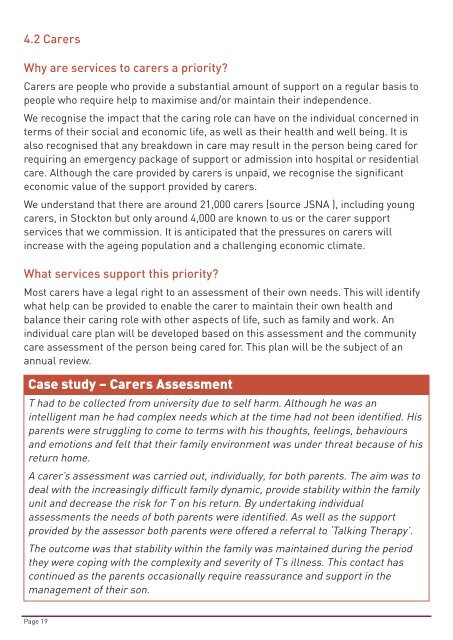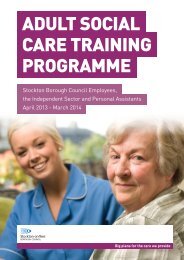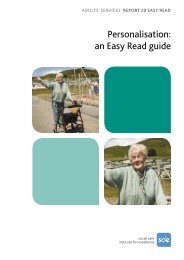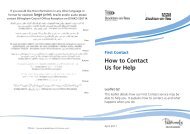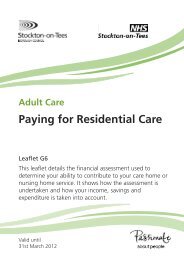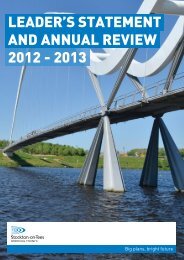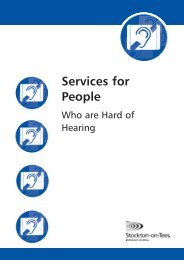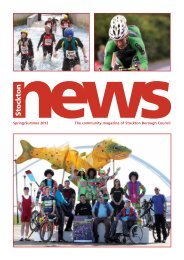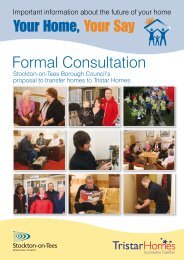View the Local Account document - Stockton-on-Tees Borough ...
View the Local Account document - Stockton-on-Tees Borough ...
View the Local Account document - Stockton-on-Tees Borough ...
Create successful ePaper yourself
Turn your PDF publications into a flip-book with our unique Google optimized e-Paper software.
4.2 Carers<br />
Why are services to carers a priority?<br />
Carers are people who provide a substantial amount of support <strong>on</strong> a regular basis to<br />
people who require help to maximise and/or maintain <str<strong>on</strong>g>the</str<strong>on</strong>g>ir independence.<br />
We recognise <str<strong>on</strong>g>the</str<strong>on</strong>g> impact that <str<strong>on</strong>g>the</str<strong>on</strong>g> caring role can have <strong>on</strong> <str<strong>on</strong>g>the</str<strong>on</strong>g> individual c<strong>on</strong>cerned in<br />
terms of <str<strong>on</strong>g>the</str<strong>on</strong>g>ir social and ec<strong>on</strong>omic life, as well as <str<strong>on</strong>g>the</str<strong>on</strong>g>ir health and well being. It is<br />
also recognised that any breakdown in care may result in <str<strong>on</strong>g>the</str<strong>on</strong>g> pers<strong>on</strong> being cared for<br />
requiring an emergency package of support or admissi<strong>on</strong> into hospital or residential<br />
care. Although <str<strong>on</strong>g>the</str<strong>on</strong>g> care provided by carers is unpaid, we recognise <str<strong>on</strong>g>the</str<strong>on</strong>g> significant<br />
ec<strong>on</strong>omic value of <str<strong>on</strong>g>the</str<strong>on</strong>g> support provided by carers.<br />
We understand that <str<strong>on</strong>g>the</str<strong>on</strong>g>re are around 21,000 carers (source JSNA ), including young<br />
carers, in <str<strong>on</strong>g>Stockt<strong>on</strong></str<strong>on</strong>g> but <strong>on</strong>ly around 4,000 are known to us or <str<strong>on</strong>g>the</str<strong>on</strong>g> carer support<br />
services that we commissi<strong>on</strong>. It is anticipated that <str<strong>on</strong>g>the</str<strong>on</strong>g> pressures <strong>on</strong> carers will<br />
increase with <str<strong>on</strong>g>the</str<strong>on</strong>g> ageing populati<strong>on</strong> and a challenging ec<strong>on</strong>omic climate.<br />
What services support this priority?<br />
Most carers have a legal right to an assessment of <str<strong>on</strong>g>the</str<strong>on</strong>g>ir own needs. This will identify<br />
what help can be provided to enable <str<strong>on</strong>g>the</str<strong>on</strong>g> carer to maintain <str<strong>on</strong>g>the</str<strong>on</strong>g>ir own health and<br />
balance <str<strong>on</strong>g>the</str<strong>on</strong>g>ir caring role with o<str<strong>on</strong>g>the</str<strong>on</strong>g>r aspects of life, such as family and work. An<br />
individual care plan will be developed based <strong>on</strong> this assessment and <str<strong>on</strong>g>the</str<strong>on</strong>g> community<br />
care assessment of <str<strong>on</strong>g>the</str<strong>on</strong>g> pers<strong>on</strong> being cared for. This plan will be <str<strong>on</strong>g>the</str<strong>on</strong>g> subject of an<br />
annual review.<br />
Case study — Carers Assessment<br />
T had to be collected from university due to self harm. Although he was an<br />
intelligent man he had complex needs which at <str<strong>on</strong>g>the</str<strong>on</strong>g> time had not been identified. His<br />
parents were struggling to come to terms with his thoughts, feelings, behaviours<br />
and emoti<strong>on</strong>s and felt that <str<strong>on</strong>g>the</str<strong>on</strong>g>ir family envir<strong>on</strong>ment was under threat because of his<br />
return home.<br />
A carer’s assessment was carried out, individually, for both parents. The aim was to<br />
deal with <str<strong>on</strong>g>the</str<strong>on</strong>g> increasingly difficult family dynamic, provide stability within <str<strong>on</strong>g>the</str<strong>on</strong>g> family<br />
unit and decrease <str<strong>on</strong>g>the</str<strong>on</strong>g> risk for T <strong>on</strong> his return. By undertaking individual<br />
assessments <str<strong>on</strong>g>the</str<strong>on</strong>g> needs of both parents were identified. As well as <str<strong>on</strong>g>the</str<strong>on</strong>g> support<br />
provided by <str<strong>on</strong>g>the</str<strong>on</strong>g> assessor both parents were offered a referral to ‘Talking Therapy’.<br />
The outcome was that stability within <str<strong>on</strong>g>the</str<strong>on</strong>g> family was maintained during <str<strong>on</strong>g>the</str<strong>on</strong>g> period<br />
<str<strong>on</strong>g>the</str<strong>on</strong>g>y were coping with <str<strong>on</strong>g>the</str<strong>on</strong>g> complexity and severity of T’s illness. This c<strong>on</strong>tact has<br />
c<strong>on</strong>tinued as <str<strong>on</strong>g>the</str<strong>on</strong>g> parents occasi<strong>on</strong>ally require reassurance and support in <str<strong>on</strong>g>the</str<strong>on</strong>g><br />
management of <str<strong>on</strong>g>the</str<strong>on</strong>g>ir s<strong>on</strong>.<br />
Page 19


